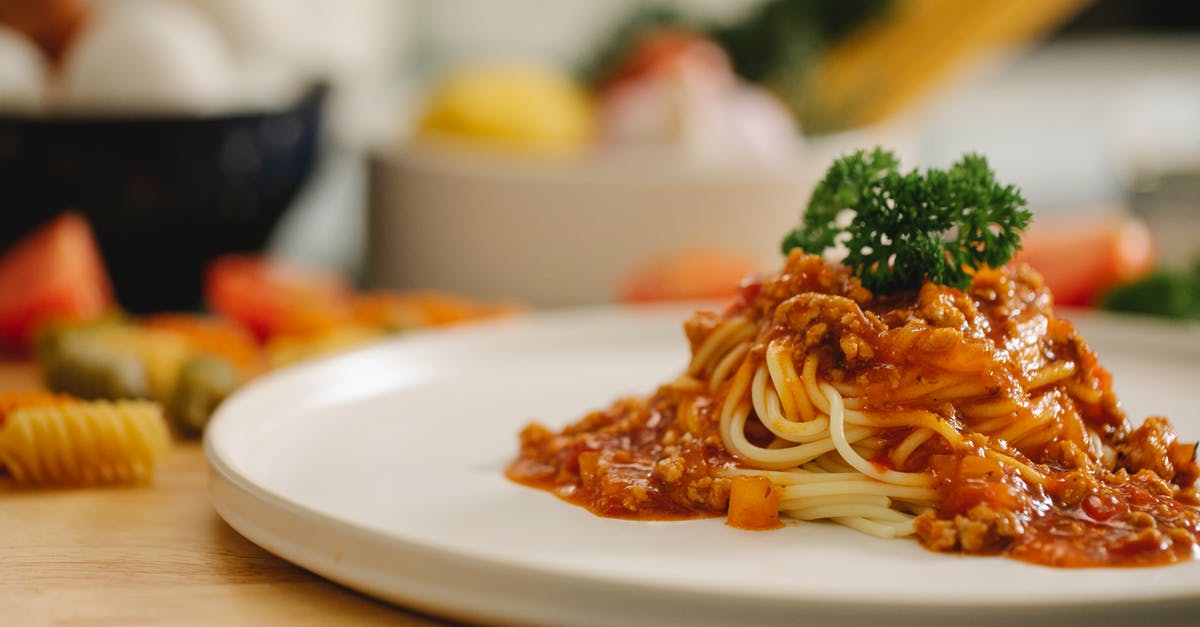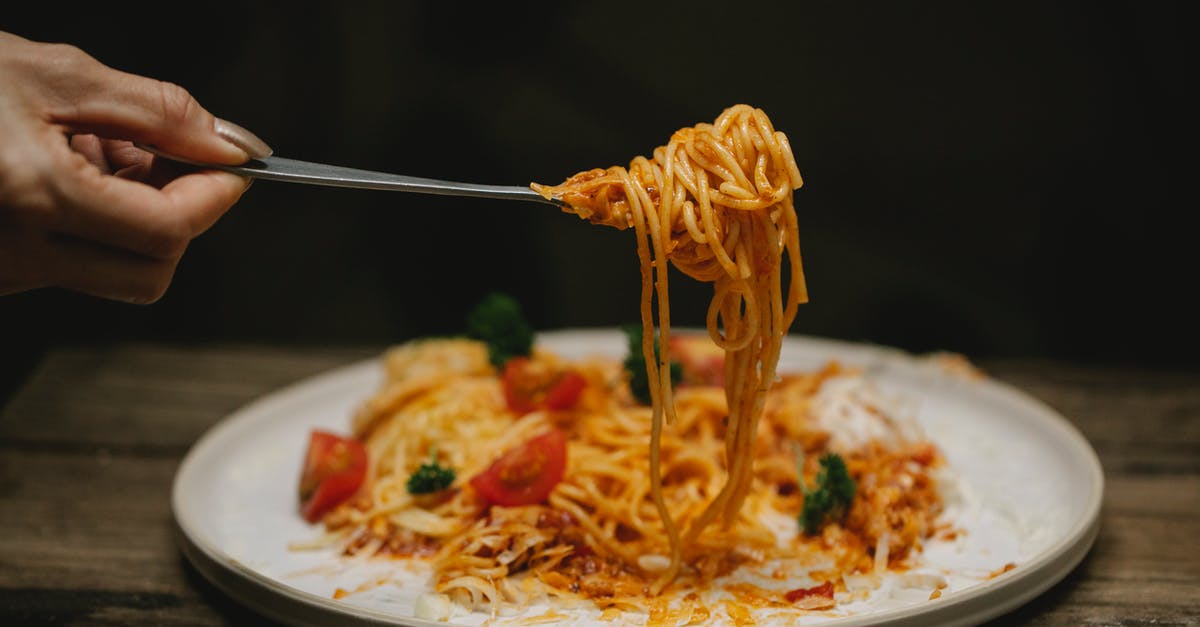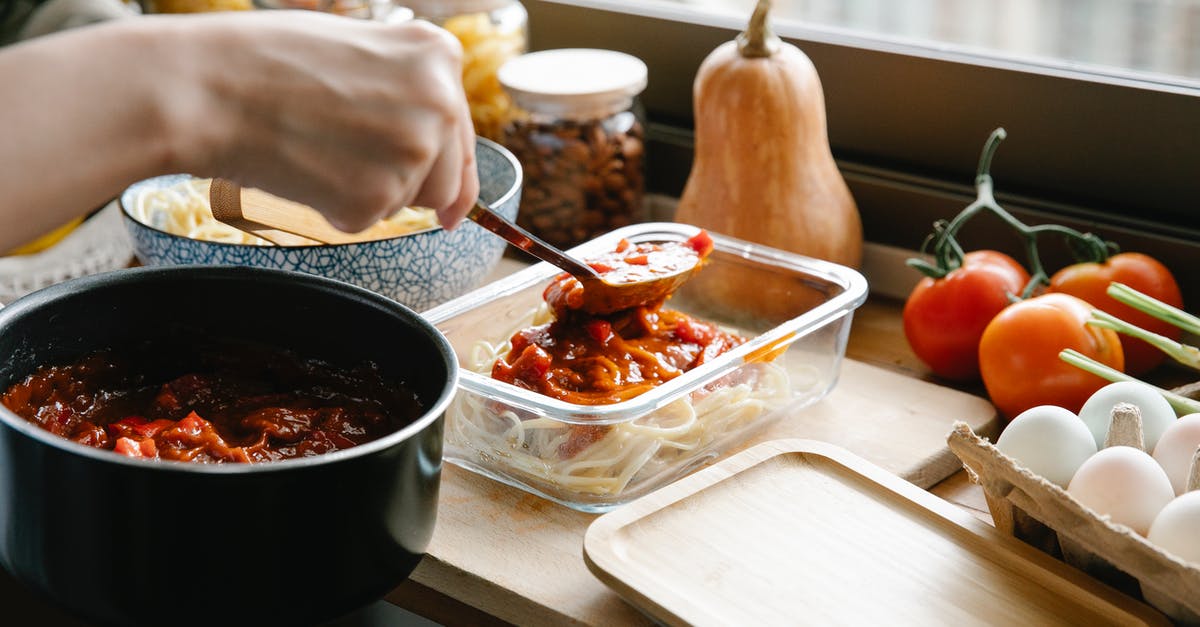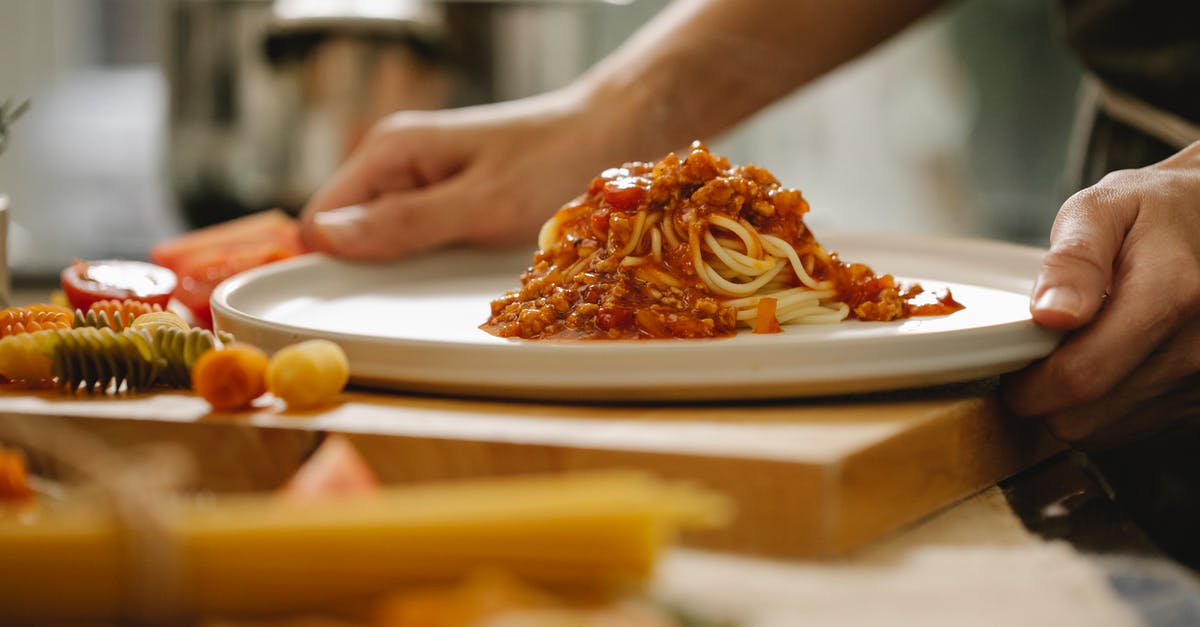How should I store bolognese sauce prep?

I want to make a huge batch of bolognese ragu sauce, and would like to do some of the prep the night before. I'm going to finely chop these ingredients:
- Beef
- Pork shoulder
- Carrots
- Celery
- Onions
...and the day after they will be fried and turned into sauce.
How should I store these chopped ingredients overnight? Will just putting them in bowls with cellophane over do? Are there any of them that probably shouldn't be prepared the day before?
Best Answer
Short version: If it's only overnight, and you seal the containers reasonably well, you'll be okay prepping any of those ingredients ahead of time and storing them in the refrigerator overnight.
I often leave onions in the fridge when preparing a recipe that calls for only half an onion, or if I've decided to use less than I prepped, or if I'm making a salsa and I chop the onions before realizing I don't have as many tomatoes as I thought, etc. If you don't cover them they will dry out a bit, but overnight doesn't do much harm; I find if they're tightly covered, whether in a glass bowl with plastic wrap or a sealed plastic storage container, they're just as good the next day.
The same goes for carrots and celery. I'm sure there's been a time when I prepped too much mirepoix; but generally speaking, if you have a cut carrot or stalk of celery in the fridge, it doesn't suffer too much overnight. More than a day and it starts to dry out; the cut surface of the carrot will start to look like the end near the tops, and possibly split. The celery dries out more quickly, as it's got higher water content and more fragile structure to begin with; more than a day and it'll lose its color, eventually turning limp and yellow, starting from the cut end.
For the veggies, the way to keep them freshest is with a tight seal and as little air as possible. You could put them in a zipper bag and squeeze out any extra air but I think a reasonably-sized glass bowl, covered tightly with plastic wrap and placed in the fridge, is good enough for 12-24 hours. If you don't have room in the fridge, you'll probably still be okay, and they may even be less prone to drying out (the air in your fridge is very low-humidity; sometimes you have a special compartment for which the humidity can be adjusted, for fruits and vegetables).
I have less experience prepping meat ahead of time, unless I'm brining or marinading it; in those situations, the meat's covered by a liquid that contains preservatives (salt, acid) that help prevent it from spoiling, and it's always refrigerated. Keeping it cool and minimizing the contact with air or contaminants is the main thing. If you only have enough room in the fridge to store some of your prepped ingredients, use it for the meat. In this case I'd say a zipper bag with the air squeezed out is the clear way to go; meat is malleable and you'll be able to get nearly all of the air out, which means it'll store almost as well as it did before you chopped it into pieces.
The thing to remember about ground, chopped or cubed meat is that anything that contaminated the outside surface of the original cut is now mixed evenly throughout. This is why it's generally safer to order a steak rare than it is to order a hamburger rare; the center of the steak hasn't been exposed to as much of its environment as the center of the burger, during handling and storage. So even if you refrigerate your prepped meat in a sealed container with the air evacuated, effectively storing it just as well as when it was in the original packaging and in one piece, I wouldn't expect it to keep the same effective "use by" date because it's been disturbed and mixed and exposed to the environment of your prep area. You're better off doing this with a cut that you purchased recently, which hasn't been refrozen and isn't nearing expiration.
Pictures about "How should I store bolognese sauce prep?"



Quick Answer about "How should I store bolognese sauce prep?"
To store, transfer Bolognese sauce to an airtight container and store in the refrigerator. Take care the container is glass or ceramic as the sauce can stain plastic containers. To store the pasta, toss it with a little olive oil to keep it from sticking together.Can you make Bolognese the day before?
Absolutely! In fact, if you can resist the temptation, I recommend making it a day before serving, as bolognese sauce tastes even better the next day! It will keep safely in the fridge for two to three days. And while you can certainly reheat it in the microwave, I like to do it in a saucepan.Does Bolognese sauce need to be refrigerated?
MEAT SAUCE, (INCLUDING BOLOGNESE SAUCE) - COOKED, HOMEMADE To maximize the shelf life of cooked meat sauce for safety and quality, refrigerate the meat sauce promptly in covered airtight containers. Properly stored, cooked meat sauce will last for 3 to 4 days in the refrigerator.Can you make spaghetti bolognese in advance?
Who doesn't love spaghetti bolognese? It's not just delicious, it's also one of the best dishes to prepare ahead of time and then eat as leftovers. If you want your pasta to taste just as good as it did on day one, you've come to the right place.How long can you keep Bolognese sauce in the fridge?
Safe storage tips for leftover bolognese Cooked bolognese sauce can last for up to 4 days in the fridge in an airtight container, or for up to 3 months in the freezer.How to Make AUTHENTIC BOLOGNESE SAUCE Like a Nonna from Bologna
More answers regarding how should I store bolognese sauce prep?
Answer 2
The previous answer is very complete and correct. However my preference based on education and experience would be to get your sauce done all at the same time and let it sit at least overnight to allow the flavors to combine and meld together. A sauce such as a bolognese has a lot of flavors. If you complete it even a week ahead and let it sit in the fridge for the week would be still great the following weekend. Tomato sauce is very acid. The acid preserves the sauce and bacteria growth is inhibited. When you reheat it to use if any bacteria is there it would die and your food is safe. If you are making a large batch to use over several months or longer, freeze it in portions that you will use to prevent having to thaw it all out.
Sources: Stack Exchange - This article follows the attribution requirements of Stack Exchange and is licensed under CC BY-SA 3.0.
Images: Klaus Nielsen, Klaus Nielsen, Sarah Chai, Klaus Nielsen
